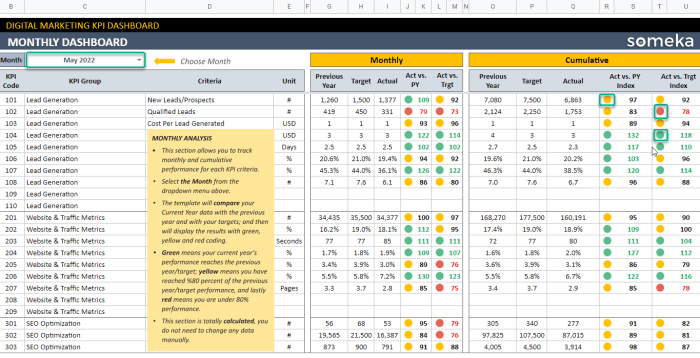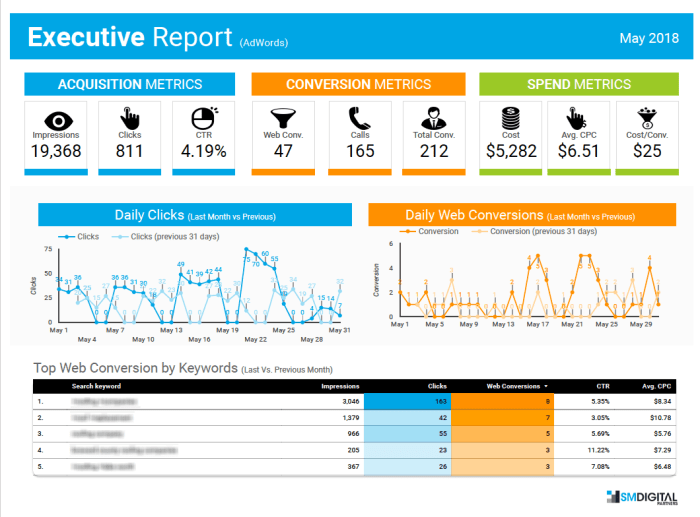Tracking Marketing KPIs is like navigating the marketing world with a GPS, ensuring you stay on track and reach your destination of success. From setting effective KPIs to analyzing data, this journey is all about making the right moves to ace your marketing game.
Importance of Tracking Marketing KPIs

Tracking Marketing Key Performance Indicators (KPIs) is essential for businesses to evaluate the effectiveness of their marketing strategies and campaigns. By monitoring these metrics, companies can make data-driven decisions, optimize their marketing efforts, and ultimately drive better results.
Examples of Key Performance Indicators
- Conversion Rate: This metric measures the percentage of website visitors who take a desired action, such as making a purchase or signing up for a newsletter.
- Customer Acquisition Cost (CAC): CAC helps businesses understand how much it costs to acquire a new customer, which is crucial for determining the profitability of marketing campaigns.
- Return on Investment (ROI): ROI calculates the revenue generated from a marketing campaign compared to the amount spent on that campaign, indicating the overall profitability.
- Website Traffic: Monitoring website traffic metrics like unique visitors, page views, and bounce rate can provide insights into the effectiveness of marketing efforts in driving online engagement.
Measuring Campaign Success
Tracking KPIs allows businesses to measure the success of their marketing campaigns objectively. By analyzing key metrics like lead generation, customer acquisition, and revenue growth, companies can assess the impact of their marketing strategies and make adjustments as needed to improve performance and achieve their goals.
Setting Effective KPIs
![]()
Setting effective Key Performance Indicators (KPIs) is crucial for tracking the success of your marketing efforts. By setting SMART goals, you can ensure that your KPIs are specific, measurable, achievable, relevant, and time-bound. Here is a detailed guide on how to set SMART marketing KPIs:
Specific
To set specific KPIs, clearly define what you want to achieve. For example, instead of setting a vague goal like “increase sales,” a specific KPI would be “increase online sales by 20% in the next quarter.”
Measurable
Make sure your KPIs are measurable so that you can track progress and success. For instance, “generate 500 leads per month” is a measurable KPI that allows you to quantify your results.
Yo, if you’re looking to level up your travel game, you gotta check out these Best Travel Credit Cards that can hook you up with some serious perks. Whether it’s free flights, hotel upgrades, or cash back on your purchases, these cards got your back. Don’t miss out on the opportunity to travel like a boss!
Achievable
Ensure that your KPIs are achievable based on your resources and capabilities. Setting unrealistic goals can lead to frustration and demotivation. An achievable KPI could be “increase website traffic by 30% in six months.”
Relevant
Your KPIs should be relevant to your overall business goals and objectives. Aligning your marketing KPIs with your business goals ensures that your efforts contribute to the growth of the company.
Yo fam, if you’re looking to travel like a baller, you gotta check out the Best Travel Credit Cards out there. These bad boys can hook you up with some serious perks and rewards while you jet-set around the globe. Don’t sleep on these cards, they can make your travel game strong!
Time-bound, Tracking Marketing KPIs
Set a timeframe for achieving your KPIs to create a sense of urgency and focus. For example, “reach 10,000 social media followers by the end of the year” is a time-bound KPI that provides a clear deadline.By following the SMART criteria and setting specific, measurable, achievable, relevant, and time-bound KPIs, you can effectively track and measure the success of your marketing campaigns.
Tools for Tracking Marketing KPIs
When it comes to tracking marketing KPIs, there are several popular tools and software options available to help businesses monitor their performance and make informed decisions. These tools offer a range of features, usability, and integration capabilities that can streamline the tracking process and provide valuable insights for marketing campaigns.
Popular Tools for Tracking Marketing KPIs
There are various tools that marketers can use to track their KPIs effectively. Let’s take a look at some of the most popular options:
- Google Analytics: A versatile tool that provides detailed insights into website traffic, user behavior, and conversion rates.
- HubSpot: Offers a comprehensive platform for tracking marketing metrics, managing campaigns, and generating reports.
- Kissmetrics: Focuses on customer behavior analysis and provides in-depth insights to improve marketing strategies.
- SEMrush: A powerful tool for monitoring performance, rankings, and competitor analysis.
Benefits of Using Automated KPI Tracking Tools
Automated KPI tracking tools offer several advantages for marketing campaigns, including:
- Efficiency: Automated tools can save time and resources by streamlining data collection and analysis processes.
- Accuracy: By automating tracking processes, the likelihood of human error is reduced, ensuring more reliable data.
- Real-time Insights: Automated tools provide instant access to up-to-date metrics, allowing marketers to make timely decisions.
- Integration: Many automated tools can integrate with other marketing platforms and software, creating a seamless workflow.
Analyzing and Acting on KPI Data
In order to make the most out of Key Performance Indicator (KPI) data, it is crucial to analyze it effectively to derive actionable insights. By understanding the trends and patterns revealed by the data, businesses can optimize their marketing strategies and make informed decisions to drive success.
Utilizing KPI Data for Optimization
- Identifying Trends: Analyzing KPI data allows businesses to identify trends over time, such as seasonal variations in customer behavior or the impact of specific marketing campaigns.
- Comparing Performance: By comparing KPI data across different time periods or marketing channels, businesses can pinpoint areas of success and areas that require improvement.
- Segmenting Data: Segmentation of KPI data based on demographics, geographies, or other factors can provide valuable insights into target audience preferences and behaviors.
- Identifying Opportunities: KPI data can reveal opportunities for growth, such as untapped market segments or underperforming marketing channels that can be optimized.
Importance of Regular Monitoring and Adjustments
Regular monitoring of KPI performance is essential for tracking progress towards marketing goals and making timely adjustments to strategies. By staying vigilant and responsive to changes in KPI data, businesses can adapt quickly to market dynamics and ensure continued success.
